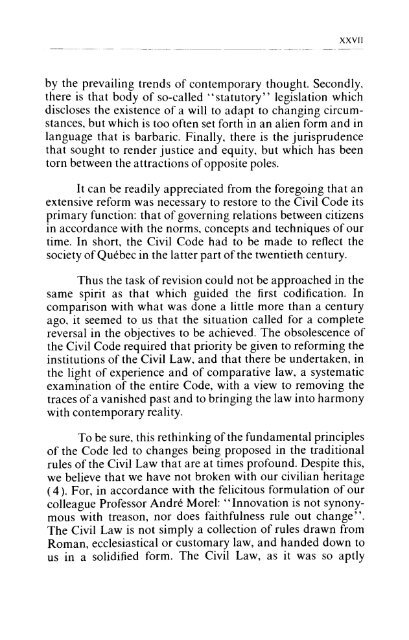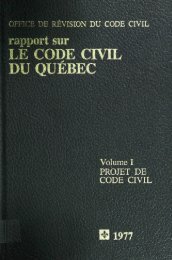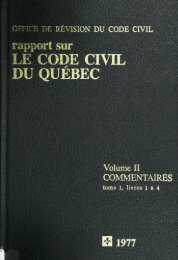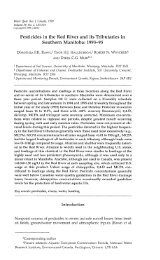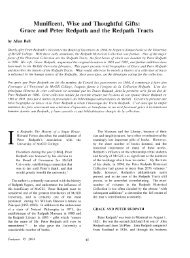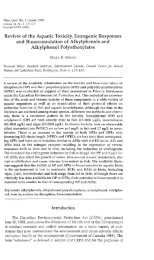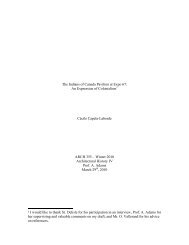- Page 1: olumel DRAFT CIVIL CODE 1977
- Page 4 and 5: The English translation of this rep
- Page 7 and 8: TABLE OF CONTENTS Pages FOREWORD xx
- Page 9 and 10: Section II- Partnership of acquests
- Page 11 and 12: Section III - Imputation of liberal
- Page 13 and 14: TITLE FOUR - DISMEMBERMENTS AND MOD
- Page 15 and 16: XIII I Hypothecary action 293 § 2
- Page 17 and 18: Chapter II- Paulian action 361 TITL
- Page 19 and 20: XVII §- 1 General provisions 412
- Page 21 and 22: XIX Section II- Insurance of person
- Page 23 and 24: XXI BOOK SIX - EVIDENCE 537 Chapter
- Page 25 and 26: FOREWORD XXIII To the many who have
- Page 27 and 28: XXIX In looking through the Draft C
- Page 29: XXV the past, would serve as a defe
- Page 33 and 34: XXXI family residence, and the rest
- Page 35 and 36: XXXIII objective (such as condition
- Page 37 and 38: XXXV of the observations warranted
- Page 39 and 40: XXXVII directed by Mrs. Alice Archa
- Page 41: BOOK ONE PERSONS
- Page 44 and 45: PERSONS rights by human persons app
- Page 47 and 48: PERSONS TITLE TWO HUMAN PERSONS CHA
- Page 49 and 50: PERSONS 23 An application for an au
- Page 51 and 52: PERSONS 11 35 If a disavowal or a c
- Page 53 and 54: PERSONS 13 2. when the name could s
- Page 55 and 56: PERSONS 15 59 The holder of the nam
- Page 57 and 58: PERSONS 17 71 If there is no declar
- Page 59 and 60: PERSONS 19 81 The certificate may m
- Page 61 and 62: KfcKSONS 21 92 A certificate of mar
- Page 63 and 64: PERSONS 23 103 The judgment mention
- Page 65 and 66: PERSONS 25 the obligations which de
- Page 67 and 68: PERSONS 27 128 There are two kinds
- Page 69 and 70: PERSONS 29 If he does not do so, an
- Page 71 and 72: PERSONS 31 159 In the cases mention
- Page 73 and 74: PERSONS 33 Section IV Testamentary
- Page 75 and 76: PERSONS 35 184 The court, on motion
- Page 77 and 78: PERSONS 37 tutor with regard to the
- Page 79 and 80: PERSONS 39 213 If the absentee is p
- Page 81 and 82:
PERSONS 41 tutorship consists of th
- Page 83 and 84:
PERSONS 43 TITLE THREE LEGAL PERSON
- Page 85 and 86:
PERSONS 45 judicial sequestrator or
- Page 87 and 88:
PERSONS 47 264 The notice calling a
- Page 89 and 90:
PERSONS 49 The directors need not b
- Page 91 and 92:
PERSONS 51 290 Even if the meeting
- Page 93:
BOOK TWO THE FAMILY
- Page 96 and 97:
56 THE FAMILY CHAPTER II CONDITIONS
- Page 98 and 99:
58 THE FAMILY For this purpose, he
- Page 100 and 101:
60 THE FAMILY 1. when either consor
- Page 102 and 103:
62 THE FAMILY 40 Articles 249 to 25
- Page 104 and 105:
64 THE FAMILY cannot be obtained fo
- Page 106 and 107:
66 THE FAMILY emphyteutic lessee of
- Page 108 and 109:
68 THE FAMILY provisions of law, or
- Page 110 and 111:
70 THE FAMILY This notice states: 1
- Page 112 and 113:
72 THE FAMILY 84 When, during the r
- Page 114 and 115:
74 THE FAMILY dispose of his acques
- Page 116 and 117:
76 THE FAMILY 103 When the regime i
- Page 118 and 119:
78 THE FAMILY before the partition,
- Page 120 and 121:
80 THE FAMILY 125 When, during the
- Page 122 and 123:
82 THE FAMILY for physical or moral
- Page 124 and 125:
84 THE FAMILY 142 The creditors may
- Page 126 and 127:
86 THE FAMILY However, without this
- Page 128 and 129:
88 THE FAMILY IV - Acceptance of th
- Page 130 and 131:
90 THE FAMILY If the spouse dies af
- Page 132 and 133:
92 THE FAMILY 185 The administrator
- Page 134 and 135:
94 THE FAMILY 199 A consort who, by
- Page 136 and 137:
96 THE FAMILY by law, by giving one
- Page 138 and 139:
98 THE FAMILY 222 The creditors of
- Page 140 and 141:
100 THE FAMILY CHAPTER IX DISSOLUTI
- Page 142 and 143:
102 THE FAMILY 244 Proof of marriag
- Page 144 and 145:
104 THE FAMILY Section VI Accessory
- Page 146 and 147:
106 THE FAMILY 265 The effects of s
- Page 148 and 149:
108 THE FAMILY 271 Maternity is ack
- Page 150 and 151:
110 THE FAMILY him by his act of bi
- Page 152 and 153:
112 THE FAMILY 296 A person adoptin
- Page 154 and 155:
114 THE FAMILY fact been assumed by
- Page 156 and 157:
116 THE FAMILY 320 As long as a chi
- Page 158 and 159:
118 THE FAMILY authorizes that pers
- Page 160 and 161:
120 THE FAMILY 343 The court may or
- Page 163 and 164:
THE FAMILY 123 TITLE FOUR PARENTAL
- Page 165 and 166:
THE FAMILY 125 364 Withdrawal entai
- Page 167:
BOOK THREE SUCCESSION
- Page 170 and 171:
130 SUCCESSION would have been enti
- Page 172 and 173:
132 SUCCESSION 20 Acts of administr
- Page 174 and 175:
134 SUCCESSION 29 The direct descen
- Page 176 and 177:
136 SUCCESSION 44 Descendants who a
- Page 178 and 179:
138 SUCCESSION Section IV Irregular
- Page 180 and 181:
140 SUCCESSION to the mass, accordi
- Page 182 and 183:
142 SUCCESSION 76 The sum which the
- Page 184 and 185:
144 SUCCESSION or provided no judgm
- Page 186 and 187:
146 SUCCESSION 99 Letters of verifi
- Page 188 and 189:
148 SUCCESSION 112 Until the term i
- Page 190 and 191:
150 SUCCESSION the benefit of inven
- Page 192 and 193:
152 SUCCESSION been neglected in th
- Page 194 and 195:
154 SUCCESSION The administrator is
- Page 196 and 197:
156 SUCCESSION CHAPTER VI UNDIVIDED
- Page 198 and 199:
158 SUCCESSION 170 When a successio
- Page 200 and 201:
160 SUCCESSION 181 The patrimony of
- Page 202 and 203:
162 SUCCESSION 191 An heir who has
- Page 204 and 205:
164 SUCCESSION the terms and condit
- Page 206 and 207:
166 SUCCESSION It is not due to par
- Page 208 and 209:
168 SUCCESSION whatever title, and
- Page 210 and 211:
170 SUCCESSION § - 2 Warranty of c
- Page 213 and 214:
SUCCESSION 173 TITLE THREE TESTAMEN
- Page 215 and 216:
SUCCESSION 175 Section II Forms of
- Page 217 and 218:
SUCCESSION 177 266 In the cases gov
- Page 219 and 220:
SUCCESSION 179 Section IV Revocatio
- Page 221 and 222:
SUCCESSION 181 289 All other legaci
- Page 223 and 224:
SUCCESSION 183 a witness also has n
- Page 225 and 226:
SUCCESSION 185 included in his shar
- Page 227 and 228:
SUCCESSION 187 the property remaini
- Page 229 and 230:
SUCCESSION 189 339 If the testator
- Page 231 and 232:
SUCCESSION 191 350 The testator may
- Page 233 and 234:
SUCCESSION 193 by a prohibition aga
- Page 235 and 236:
SUCCESSION 195 legal representative
- Page 237 and 238:
SUCCESSION 197 387 If substituted p
- Page 239:
SUCCESSION 199 400 The institute wh
- Page 243 and 244:
PROPERTY 203 TITLE ONE NATURE AND K
- Page 245:
PROPERTY 205 A treasure found on la
- Page 248 and 249:
208 PROPERTY 26 A thief may never i
- Page 250 and 251:
210 PROPERTY dividing line, or comp
- Page 252 and 253:
212 PROPERTY The court, taking acco
- Page 254 and 255:
214 PROPERTY 58 A neighbour who has
- Page 256 and 257:
216 PROPERTY The indemnity is not r
- Page 258 and 259:
218 PROPERTY He may not compel the
- Page 260 and 261:
220 PROPERTY 90 If a watercourse le
- Page 262 and 263:
222 PROPERTY Section II Rights and
- Page 264 and 265:
224 PROPERTY 111 If, at the beginni
- Page 266 and 267:
226 PROPERTY 121 The usufructuary m
- Page 268 and 269:
228 PROPERTY enjoys the proceeds of
- Page 270 and 271:
230 PROPERTY 139 The usufructuary b
- Page 272 and 273:
232 PROPERTY 147 Usufruct is exting
- Page 274 and 275:
234 PROPERTY If he takes only some
- Page 276 and 277:
236 PROPERTY 168 The dominant owner
- Page 278 and 279:
238 PROPERTY As regards continuous
- Page 280 and 281:
240 PROPERTY 191 The undivided owne
- Page 282 and 283:
242 PROPERTY Any act the effect of
- Page 284 and 285:
244 PROPERTY foundations and main w
- Page 286 and 287:
246 PROPERTY separate cadastral num
- Page 288 and 289:
248 PROPERTY to maintain or by defe
- Page 290 and 291:
250 PROPERTY writing, over the sign
- Page 292 and 293:
252 PROPERTY CHAPTER V EMPHYTEUSIS
- Page 294 and 295:
254 PROPERTY Section III Terminatio
- Page 296 and 297:
256 PROPERTY 271 The contract must
- Page 298 and 299:
258 PROPERTY Section II Presumption
- Page 300 and 301:
260 PROPERTY vendor is still within
- Page 302 and 303:
262 PROPERTY 303 The preceding arti
- Page 304 and 305:
264 PROPERTY act granting it specif
- Page 306 and 307:
266 PROPERTY Section III General hy
- Page 308 and 309:
268 PROPERTY 334 Once the debtor's
- Page 310 and 311:
270 PROPERTY collected which exceed
- Page 312 and 313:
272 PROPERTY creditor grants a main
- Page 314 and 315:
274 PROPERTY The domicile so electe
- Page 316 and 317:
276 PROPERTY 372 A testamentary hyp
- Page 318 and 319:
278 PROPERTY must comply with the p
- Page 320 and 321:
280 PROPERTY Section IV Publication
- Page 322 and 323:
282 PROPERTY hypothec is effected i
- Page 324 and 325:
284 PROPERTY 404 In the event of de
- Page 326 and 327:
286 PROPERTY 4. he may take the pro
- Page 328 and 329:
288 PROPERTY reimbursement and whic
- Page 330 and 331:
290 PROPERTY Section III Sale other
- Page 332 and 333:
292 PROPERTY interested person agai
- Page 334 and 335:
294 PROPERTY 451 When property has
- Page 336 and 337:
296 PROPERTY However, as between th
- Page 338 and 339:
298 PROPERTY This article does not
- Page 341 and 342:
PROPERTY 301 TITLE SIX ADMINISTRATI
- Page 343 and 344:
PROPERTY 303 are useful for the pre
- Page 345 and 346:
PROPERTY 305 not bound to subordina
- Page 347 and 348:
PROPERTY 307 525 An administrator m
- Page 349 and 350:
PROPERTY 309 In particular, it incl
- Page 351 and 352:
PROPERTY 311 542 In the case of suc
- Page 353 and 354:
PROPERTY 313 to pay sufficient subs
- Page 355 and 356:
PROPERTY 315 555 An administrator m
- Page 357 and 358:
PROPERTY 317 566 When several admin
- Page 359 and 360:
PROPERTY 319 576 An administrator i
- Page 361 and 362:
PROPERTY 321 The account may be sum
- Page 363 and 364:
PROPERTY 323 TITLE SEVEN TRUSTS CHA
- Page 365 and 366:
PROPERTY 325 However, the donor may
- Page 367 and 368:
PROPERTY 327 626 The grantor or the
- Page 369:
PROPERTY 329 The court designates t
- Page 373 and 374:
OBLIGATIONS 333 Introductory provis
- Page 375 and 376:
OBLIGATIONS 335 14 An offer may be
- Page 377 and 378:
OBLIGATIONS 337 29 Consent may be v
- Page 379 and 380:
OBLIGATIONS 339 In this case, the f
- Page 381 and 382:
OBLIGATIONS 341 the fruits of the t
- Page 383 and 384:
OBLIGATIONS 343 73 Rights and oblig
- Page 385 and 386:
OBLIGATIONS 345 90 The stipulator's
- Page 387 and 388:
OBLIGATIONS 347 any other person wh
- Page 389 and 390:
OBLIGATIONS 349 them at his own exp
- Page 391:
OBLIGATIONS 351 the day of the dema
- Page 394 and 395:
354 OBLIGATIONS 139 Before the term
- Page 396 and 397:
356 OBLIGATIONS CHAPTER III SOLIDAR
- Page 398 and 399:
358 OBLIGATIONS 173 Each of the sol
- Page 400 and 401:
360 OBLIGATIONS failed to exercise
- Page 402 and 403:
362 OBLIGATIONS recourse, unless th
- Page 404 and 405:
364 OBLIGATIONS Payment made to a p
- Page 406 and 407:
366 OBLIGATIONS 3. in favour of a p
- Page 408 and 409:
368 OBLIGATIONS 238 A creditor in d
- Page 410 and 411:
370 OBLIGATIONS payment which he ma
- Page 412 and 413:
372 OBLIGATIONS The period must be
- Page 414 and 415:
374 OBLIGATIONS CHAPTER III REDUCTI
- Page 416 and 417:
376 OBLIGATIONS 285 Resiliation occ
- Page 418 and 419:
378 OBLIGATIONS under Section 28 of
- Page 420 and 421:
380 OBLIGATIONS Section II Apportio
- Page 422 and 423:
382 OBLIGATIONS 320 When several de
- Page 424 and 425:
384 OBLIGATIONS CHAPTER III CONFUSI
- Page 426 and 427:
386 OBLIGATIONS If the execution of
- Page 428 and 429:
388 OBLIGATIONS property which he w
- Page 430 and 431:
390 OBLIGATIONS 372 The vendor assu
- Page 432 and 433:
392 OBLIGATIONS cannot be determine
- Page 434 and 435:
394 OBLIGATIONS 399 An auction sale
- Page 436 and 437:
396 OBLIGATIONS purchaser is exempt
- Page 438 and 439:
398 OBLIGATIONS continues the vendo
- Page 440 and 441:
400 OBLIGATIONS received, the debts
- Page 442 and 443:
402 OBLIGATIONS Only the minor may
- Page 444 and 445:
404 OBLIGATIONS § - 3 Conditions a
- Page 446 and 447:
406 OBLIGATIONS However, the gift h
- Page 448 and 449:
408 OBLIGATIONS 1. deliver the thin
- Page 450 and 451:
410 OBLIGATIONS 508 The lessee is r
- Page 452 and 453:
412 OBLIGATIONS lessee may avoid th
- Page 454 and 455:
414 OBLIGATIONS Where the lease is
- Page 456 and 457:
416 OBLIGATIONS 540 The lessor is b
- Page 458 and 459:
418 OBLIGATIONS /// - Resiliation o
- Page 460 and 461:
420 OBLIGATIONS 559 Any penal claus
- Page 462 and 463:
422 OBLIGATIONS CHAPTER IV AFFREIGH
- Page 464 and 465:
424 OBLIGATIONS 585 The lessee main
- Page 466 and 467:
426 OBLIGATIONS 598 The lessor reta
- Page 468 and 469:
428 OBLIGATIONS 612 Transport of pe
- Page 470 and 471:
430 OBLIGATIONS 628 If the consigne
- Page 472 and 473:
432 OBLIGATIONS their value exceeds
- Page 474 and 475:
434 OBLIGATIONS 649 Subject to Arti
- Page 476 and 477:
436 OBLIGATIONS 654 In the case of
- Page 478 and 479:
438 OBLIGATIONS 659 Any deviation i
- Page 480 and 481:
440 OBLIGATIONS 665 Nothing in the
- Page 482 and 483:
442 OBLIGATIONS However, the court
- Page 484 and 485:
444 OBLIGATIONS 685 This chapter al
- Page 486 and 487:
446 OBLIGATIONS 694 Work done in se
- Page 488 and 489:
448 OBLIGATIONS such that the other
- Page 490 and 491:
450 OBLIGATIONS In all cases, the m
- Page 492 and 493:
452 OBLIGATIONS 729 The mandator ow
- Page 494 and 495:
454 OBLIGATIONS 740 If the mandatar
- Page 496 and 497:
456 OBLIGATIONS 754 A partner may n
- Page 498 and 499:
458 OBLIGATIONS 764 In addition to
- Page 500 and 501:
460 OBLIGATIONS that the partnershi
- Page 502 and 503:
462 OBLIGATIONS Section III Associa
- Page 504 and 505:
464 OBLIGATIONS Section II Obligati
- Page 506 and 507:
466 OBLIGATIONS CHAPTER XII SEQUEST
- Page 508 and 509:
468 OBLIGATIONS 831 A borrower bear
- Page 510 and 511:
470 OBLIGATIONS contracted under mo
- Page 512 and 513:
472 UDL1VJ/M IWl JS In all cases, t
- Page 514 and 515:
474 OBLIGATIONS covers the particip
- Page 516 and 517:
476 OBLIGATIONS 884 Participating c
- Page 518 and 519:
478 OBLIGATIONS 1. the name of the
- Page 520 and 521:
480 OBLIGATIONS /// - Statement of
- Page 522 and 523:
482 OBLIGATIONS 911 The premium doe
- Page 524 and 525:
484 OBLIGATIONS 923 Where benefits
- Page 526 and 527:
486 OBLIGATIONS may only be made in
- Page 528 and 529:
488 OBLIGATIONS 946 Sums insured pa
- Page 530 and 531:
490 OBLIGATIONS However, the insure
- Page 532 and 533:
492 OBLIGATIONS If the insured fail
- Page 534 and 535:
494 OBLIGATIONS 979 In the case of
- Page 536 and 537:
496 OBLIGATIONS 993 Insurance of a
- Page 538 and 539:
498 OBLIGATIONS derive from the use
- Page 540 and 541:
500 OBLIGATIONS safety or due arriv
- Page 542 and 543:
502 OBLIGATIONS cost of the goods i
- Page 544 and 545:
504 OBLIGATIONS Omissions or errone
- Page 546 and 547:
506 OBLIGATIONS 1050 Where insuranc
- Page 548 and 549:
508 OBLIGATIONS assured, the ship w
- Page 550 and 551:
510 OBLIGATIONS rights of the perso
- Page 552 and 553:
512 OBLIGATIONS The same applies wh
- Page 554 and 555:
514 OBLIGATIONS 1095 Where, by a pe
- Page 556 and 557:
516 OBLIGATIONS 3. when the cost of
- Page 558 and 559:
518 OBLIGATIONS insured and all pro
- Page 560 and 561:
520 OBLIGATIONS insured, in the cas
- Page 562 and 563:
522 OBLIGATIONS 1145 Where the assu
- Page 564 and 565:
524 OBLIGATIONS insurer any expense
- Page 566 and 567:
526 OBLIGATIONS § - 15 Under insur
- Page 568 and 569:
528 OBLIGATIONS place provided he p
- Page 570 and 571:
530 OBLIGATIONS CHAPTER XVII GAMING
- Page 572 and 573:
532 OBLIGATIONS Section II Arbitrat
- Page 574 and 575:
534 OBLIGATIONS 1225 The arbitratio
- Page 576 and 577:
536 OBLIGATIONS 1237 The court may
- Page 579 and 580:
EVIDENCE 539 CHAPTER I GENERAL PROV
- Page 581 and 582:
EVIDENCE 541 by a competent public
- Page 583 and 584:
EVIDENCE 543 outside Quebec, in the
- Page 585 and 586:
EVIDENCE 545 41 To make proof, test
- Page 587 and 588:
EVIDENCE 547 52 A legal presumption
- Page 589 and 590:
EVIDENCE 549 CHAPTER III ADMISSIBIL
- Page 591:
BOOK SEVEN PRESCRIPTION
- Page 594 and 595:
554 PRESCRIPTION CHAPTER II RENUNCI
- Page 596 and 597:
556 PRESCRIPTION However, when the
- Page 599 and 600:
PRESCRIPTION 559 TITLE TWO ACQUISIT
- Page 601:
PRESCRIPTION 561 CHAPTER III PERIOD
- Page 605:
BOOK EIGHT PUBLICATION OF RIGHTS
- Page 608 and 609:
568 PUBLICATION OF RIGHTS 8 The rig
- Page 610 and 611:
570 PUBLICATION OF RIGHTS 4. a modi
- Page 612 and 613:
572 PUBLICATION OF RIGHTS minutes o
- Page 614 and 615:
574 PUBLICATION OF RIGHTS 6. the na
- Page 616 and 617:
576 PUBLICATION OF RIGHTS minute nu
- Page 618 and 619:
578 PUBLICATION OF RIGHTS 53 If the
- Page 620 and 621:
580 PUBLICATION OF RIGHTS Section I
- Page 622 and 623:
582 PUBLICATION OF RIGHTS The Minis
- Page 624 and 625:
584 PUBLICATION OF RIGHTS effected
- Page 626 and 627:
586 PUBLICATION OF RIGHTS 96 Subjec
- Page 628 and 629:
588 PUBLICATION OF RIGHTS 106 A jud
- Page 630 and 631:
590 PUBLICATION OF RIGHTS immoveabl
- Page 633 and 634:
PRIVATE INTERNATIONAL LAW 593 PRELI
- Page 635 and 636:
PRIVATE INTERNATIONAL LAW 595 11 Fi
- Page 637 and 638:
PRIVATE INTERNATIONAL LAW 597 the l
- Page 639 and 640:
PRIVATE INTERNATIONAL LAW 599 Any a
- Page 641 and 642:
PRIVATE INTERNATIONAL LAW 601 of th
- Page 643 and 644:
PRIVATE INTERNATIONAL LAW 603 provi
- Page 645 and 646:
PRIVATE INTERNATIONAL LAW 605 53 In
- Page 647 and 648:
PRIVATE INTERNATIONAL LAW 607 court
- Page 649 and 650:
PRIVATE INTERNATIONAL LAW 609 estab
- Page 651 and 652:
PRIVATE INTERNATIONAL LAW 611 77 An
- Page 653 and 654:
PRIVATE INTERNATIONAL LAW 613 agree
- Page 655 and 656:
PRIVATE INTERNATIONAL LAW 615 11. "
- Page 657 and 658:
PRIVATE INTERNATIONAL LAW 617 The w
- Page 659:
TABLES OF CONCORDANCE
- Page 662 and 663:
622 TABLE A Articles of the Civil C
- Page 664 and 665:
624 Articles of the Civil Code 120
- Page 666 and 667:
626 TABLE A Articles of the Civil C
- Page 668 and 669:
628 TABLE A Articles of the Civil C
- Page 670 and 671:
630 TABLE A Articles of the Civil C
- Page 672 and 673:
632 lABLfcA Articles of the Civil C
- Page 674 and 675:
634 TABLE A Articles of the Civil C
- Page 676 and 677:
636 Articles of the Civil Code 572
- Page 678 and 679:
638 TABLE A Articles of the Civil C
- Page 680 and 681:
640 TABLE A Articles of the Civil 7
- Page 682 and 683:
642 TABLE A Articles of the Civil C
- Page 684 and 685:
644 TABLE A Articles of the Civil C
- Page 686 and 687:
646 TABLE A Articles of the Civi 1
- Page 688 and 689:
648 TABLE A Articles of the Civil C
- Page 690 and 691:
650 TABLE A Articles of the Civil C
- Page 692 and 693:
652 TABLE A Articles of the Civil C
- Page 694 and 695:
654 TABLE A Articles of the Civil C
- Page 696 and 697:
656 TABLE A Articles of the Civil C
- Page 698 and 699:
658 TABLE A Articles of the Civil C
- Page 700 and 701:
660 TABLE A Articles of the Civil C
- Page 702 and 703:
662 TABLE A Articles of the Civil C
- Page 704 and 705:
664 l/\DloIo Articles of the Civil
- Page 706 and 707:
666 TABLE A Articles of the Civil C
- Page 708 and 709:
668 TABLE A Articles of the Civil C
- Page 710 and 711:
670 TABLE A Articles of the Civil C
- Page 712 and 713:
672 TABLE A Articles of the Civil C
- Page 714 and 715:
674 TABLE A Articles of the Civil C
- Page 716 and 717:
676 TABLE A Articles of Articles of
- Page 718 and 719:
678 Articles of the Civil Code 2141
- Page 720 and 721:
680 TABLE A Articles of Articles of
- Page 722 and 723:
682 TABLE A Articles of Articles of
- Page 724 and 725:
684 TABLE A Articles of the Civil C
- Page 726 and 727:
686 TABLE A Articles of the Civil C
- Page 728 and 729:
688 TABLE A Articles of the Civil C
- Page 730 and 731:
690 Articles of the Civil Code 2677
- Page 732 and 733:
692 TABLE B Articles of the Draft 3
- Page 734 and 735:
694 TABLE B Articles of the Draft 1
- Page 736 and 737:
696 Articles of the Draft 162 163 *
- Page 738 and 739:
698 TABLE B Article* iOf the Draft
- Page 740 and 741:
700 TABLE B Articles of the Draft 9
- Page 742 and 743:
702 TABLE B Articles of Articles of
- Page 744 and 745:
704 TABLE B Articles of Articles of
- Page 746 and 747:
706 TABLE B Articles of the Draft 2
- Page 748 and 749:
708 TABLE B Articles of the Draft 2
- Page 750 and 751:
710 TABLE B Articles of the Draft 3
- Page 752 and 753:
712 Articles of the Draft 70 ** 71
- Page 754 and 755:
714 Articles of the Draft 147 ** 14
- Page 756 and 757:
716 TABLE B Articles of the Draft 2
- Page 758 and 759:
718 TABLE B Articles of the Draft 3
- Page 760 and 761:
720 TABLE B Articles of the Draft 3
- Page 762 and 763:
722 Articles of the Draft 48 49 50
- Page 764 and 765:
724 TABLE B Articles of the Draft 1
- Page 766 and 767:
726 TABLE B Articles of Articles of
- Page 768 and 769:
728 TABLE B Articles of the Draft 2
- Page 770 and 771:
730 1ADLC Articles of Articles of t
- Page 772 and 773:
732 Articles of the Draft 415 416 4
- Page 774 and 775:
734 TABLE B Articles of the Draft 4
- Page 776 and 777:
736 Articles of the Draft 565 566 5
- Page 778 and 779:
738 TABLE B Articles of the Draft 2
- Page 780 and 781:
740 TABLE B Articles of Articles of
- Page 782 and 783:
742 TABLE B Article* >of the Draft
- Page 784 and 785:
744 TABLE B Articles of the Draft 2
- Page 786 and 787:
746 TABLE B Articles of the Draft 3
- Page 788 and 789:
748 TABLE B Articles of the Draft 3
- Page 790 and 791:
750 TABLE B Articles of Articles of
- Page 792 and 793:
752 TABLE B Articles of Articles of
- Page 794 and 795:
754 TABLE B Articles of the Draft 6
- Page 796 and 797:
756 TABLE B Articles of the Draft 6
- Page 798 and 799:
758 TABLE B Articles of the Draft 7
- Page 800 and 801:
760 TABLE B Articles of the Draft 8
- Page 802 and 803:
762 TABLE B Articles of the Draft 9
- Page 804 and 805:
764 Articles of the Draft 997 998 9
- Page 806 and 807:
766 TABLE B Articles of the Draft 1
- Page 808 and 809:
768 TABLE B Articles of the Draft 1
- Page 810 and 811:
770 TABLE B Articles of the Draft 1
- Page 812 and 813:
772 TABLE B Articles of the Draft 6
- Page 814 and 815:
774 TABLE B Articles of Articles of
- Page 816 and 817:
776 Articles of the Draft 70 71 72
- Page 818 and 819:
778 TABLE B Articles of the Draft 2
- Page 820 and 821:
780 TABLE B Articles of Articles of
- Page 823:
Printing completed June 9,1978 at I


